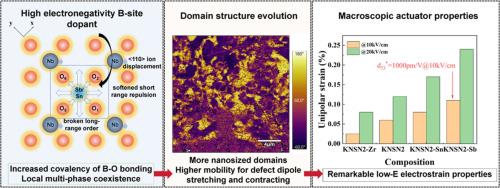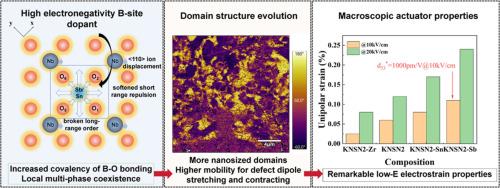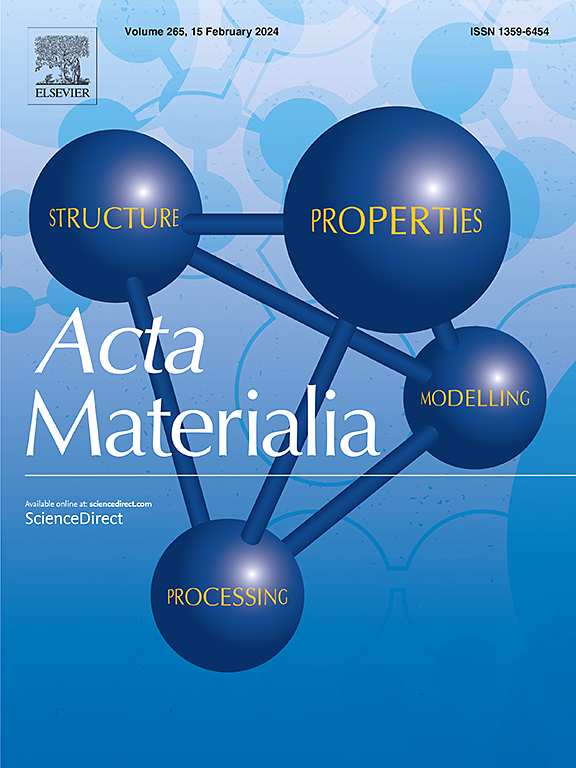通过在无铅 K0.5Na0.5NbO3 基陶瓷中取代高电负性 B 晶位来增强低电应变
IF 8.3
1区 材料科学
Q1 MATERIALS SCIENCE, MULTIDISCIPLINARY
引用次数: 0
摘要
为解决环境问题,无铅压电致动器有望取代含铅致动器。然而,它们往往面临低驱动电场和高电应变之间的权衡。在此,我们提出了一种新策略,通过在过氧化物铌酸钠钾基陶瓷中掺入高电负性 B 位原子来提高低电场下的电应变。我们的研究结果表明,高电负性 B 位原子提高了 B-O 键的共价性,软化了短程斥力并引入了局部多相共存。这导致了更多的纳米级畴结构和更低的矫顽力场,从而能在较低的电场下产生较大的应变。值得注意的是,在 10kV cm-1 的电压下,掺杂硒和锑的铌酸钾钠陶瓷可产生 0.2% 的双极性电应变和 0.1% 的单极性电应变,而且工作频率和温度范围更广,抗疲劳性也非常出色。这项研究揭示了设计具有显著电应变性能和低驱动电场的无铅压电陶瓷的创新见解,有望在无铅压电材料科学和压电致动器领域取得重大进展。本文章由计算机程序翻译,如有差异,请以英文原文为准。


Boosting Low-E electro-strain via high-electronegativity B-site substitution in lead-free K0.5Na0.5NbO3-based ceramics
Lead-free piezoelectric actuators emerge as promising substitutes for their lead-containing counterparts to address environmental concerns. However, they often confront a trade-off between low driving electric fields and high electro-strain. Herein, a novel strategy to boost electro-strain under low electric fields is proposed by doping high-electronegativity B-site atoms into perovskite potassium sodium niobate-based ceramics. Our findings reveal that high-electronegativity B-site atoms elevate the covalency of B-O bonding, softening the short-range repulsion and introducing local multiphase coexistence. This leads to more nanoscale domain structures and lower coercive field, thereby enabling large strains to be produced at lower electric fields. Notably, a substantial 0.2 % bipolar electro-strain and 0.1 % unipolar electro-strain under 10 kV cm-1 is achieved in Sr, Sb co-doped potassium sodium niobate ceramics, with a broad working frequency and temperature range, as well as excellent fatigue resistance. This study unveils innovative insights into designing lead-free piezoelectric ceramics with remarkable electro-strain performance and low driving electric field, promising a significant advancement in lead-free piezoelectric materials science and piezoelectric actuators.
求助全文
通过发布文献求助,成功后即可免费获取论文全文。
去求助
来源期刊

Acta Materialia
工程技术-材料科学:综合
CiteScore
16.10
自引率
8.50%
发文量
801
审稿时长
53 days
期刊介绍:
Acta Materialia serves as a platform for publishing full-length, original papers and commissioned overviews that contribute to a profound understanding of the correlation between the processing, structure, and properties of inorganic materials. The journal seeks papers with high impact potential or those that significantly propel the field forward. The scope includes the atomic and molecular arrangements, chemical and electronic structures, and microstructure of materials, focusing on their mechanical or functional behavior across all length scales, including nanostructures.
 求助内容:
求助内容: 应助结果提醒方式:
应助结果提醒方式:


